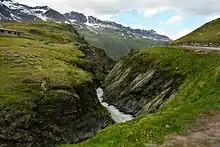Obergurgl
Obergurgl is a village in the Ötztal Alps in Tyrol, Austria. Located in the municipality of Sölden, the village has approximately 400 year-round inhabitants, and is mainly a tourist resort.


At an elevation of 1,930 m (6,330 ft), Obergurgl is the highest parish in Austria. The parish church was consecrated in 1737, and in 1967 extensions were added based on plans by Clemens Holzmeister.
Obergurgl forms part of the ski resort area of Obergurgl-Hochgurgl and lies at the southern end of the Ötztal Gurglertal valley, the longest side valley off the Inntal valley. It is a popular hiking area during the summer, with hanging valleys to the east that lead over into the Italian province of South Tyrol. There are numerous peaks over 3,500 m (11,500 ft) and several glaciers, which offer the more adventurous hikers a challenge.
There is a breeding establishment for Haflinger horses in the village, which is owned by the Scheiber family, who also own the Hotel Edelweiss & Gurgl.[1]
Obergurgl became famous in 1931, when the Swiss explorer Auguste Piccard was forced to land on the nearby Großer Gurgler Ferner glacier during his historic balloon flight, during which he became the first man to fly into the stratosphere.
Climate
Obergurgl has a subarctic climate (Koppen: Dfc) bordering on a tundra climate (ET). Summers are cool and rainy, while winters are cold and extremely snowy. Annual snowfall averages 476 inches (188 cm) with heavy snowfall falling from October through may with light snowfall in June and September. Snowfall in the summer months of July and August is not rare, and may happen once every few years.[2]
| Climate data for Obergurgl (1971–2000) | |||||||||||||
|---|---|---|---|---|---|---|---|---|---|---|---|---|---|
| Month | Jan | Feb | Mar | Apr | May | Jun | Jul | Aug | Sep | Oct | Nov | Dec | Year |
| Record high °C (°F) | 9.2 (48.6) |
11.0 (51.8) |
11.7 (53.1) |
13.7 (56.7) |
20.5 (68.9) |
24.0 (75.2) |
26.7 (80.1) |
25.5 (77.9) |
23.0 (73.4) |
19.5 (67.1) |
15.1 (59.2) |
10.0 (50.0) |
26.7 (80.1) |
| Average high °C (°F) | −1.0 (30.2) |
−0.1 (31.8) |
2.1 (35.8) |
4.5 (40.1) |
9.7 (49.5) |
13.2 (55.8) |
16.1 (61.0) |
15.9 (60.6) |
12.6 (54.7) |
8.6 (47.5) |
2.5 (36.5) |
−0.3 (31.5) |
7.0 (44.6) |
| Daily mean °C (°F) | −5.0 (23.0) |
−5.1 (22.8) |
−3.0 (26.6) |
−0.2 (31.6) |
5.0 (41.0) |
8.2 (46.8) |
10.7 (51.3) |
10.4 (50.7) |
7.1 (44.8) |
3.6 (38.5) |
−1.8 (28.8) |
−4.1 (24.6) |
2.2 (36.0) |
| Average low °C (°F) | −8.0 (17.6) |
−8.3 (17.1) |
−6.2 (20.8) |
−3.5 (25.7) |
1.3 (34.3) |
4.0 (39.2) |
6.4 (43.5) |
6.6 (43.9) |
3.7 (38.7) |
0.5 (32.9) |
−4.6 (23.7) |
−7.0 (19.4) |
−1.3 (29.7) |
| Record low °C (°F) | −28.0 (−18.4) |
−23.4 (−10.1) |
−25.5 (−13.9) |
−15.7 (3.7) |
−10.7 (12.7) |
−3.3 (26.1) |
−1.3 (29.7) |
−1.8 (28.8) |
−5.5 (22.1) |
−12.2 (10.0) |
−19.2 (−2.6) |
−23.6 (−10.5) |
−28.0 (−18.4) |
| Average precipitation mm (inches) | 48.2 (1.90) |
42.3 (1.67) |
59.3 (2.33) |
61.5 (2.42) |
79.6 (3.13) |
90.6 (3.57) |
91.4 (3.60) |
88.0 (3.46) |
60.9 (2.40) |
73.8 (2.91) |
66.6 (2.62) |
57.0 (2.24) |
819.2 (32.25) |
| Average snowfall cm (inches) | 59.3 (23.3) |
63.4 (25.0) |
66.8 (26.3) |
62.4 (24.6) |
27.2 (10.7) |
14.3 (5.6) |
4.5 (1.8) |
2.6 (1.0) |
10.5 (4.1) |
31.7 (12.5) |
64.7 (25.5) |
68.1 (26.8) |
475.5 (187.2) |
| Average precipitation days (≥ 1.0 mm) | 7.7 | 7.5 | 9.4 | 9.5 | 10.7 | 12.2 | 12.1 | 10.9 | 8.3 | 7.9 | 9.0 | 8.8 | 114.0 |
| Average relative humidity (%) (at 14:00) | 52.3 | 49.8 | 50.0 | 51.8 | 51.7 | 51.7 | 49.9 | 50.8 | 50.4 | 50.5 | 54.5 | 55.3 | 51.6 |
| Mean monthly sunshine hours | 40.2 | 70.8 | 105.6 | 126.1 | 149.5 | 144.3 | 172.5 | 161.5 | 128.1 | 86.4 | 49.4 | 34.4 | 1,268.8 |
| Percent possible sunshine | 46.6 | 50.4 | 49.0 | 48.6 | 46.7 | 43.8 | 53.0 | 55.9 | 55.4 | 48.4 | 48.0 | 51.3 | 49.8 |
| Source: Central Institute for Meteorology and Geodynamics[3] | |||||||||||||
References
- "Edelweiss Gurgl: History". Hotel Edelweiss & Gurgl. Retrieved 2007-12-10.
- "Obergurgl climate: Average Temperature, weather by month, Obergurgl weather averages - Climate-Data.org". en.climate-data.org. Retrieved 2020-05-31.
- "Klimadaten von Österreich 1971–2000 – Tirol-Obergurgl" (in German). Central Institute for Meteorology and Geodynamics. Archived from the original on 12 October 2019. Retrieved 31 October 2019.